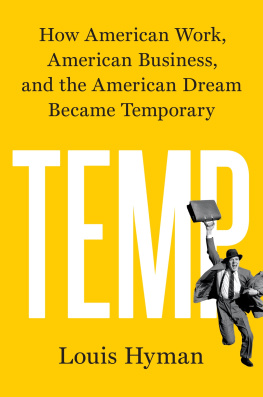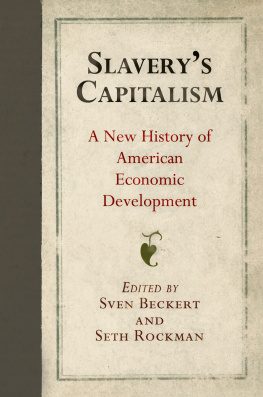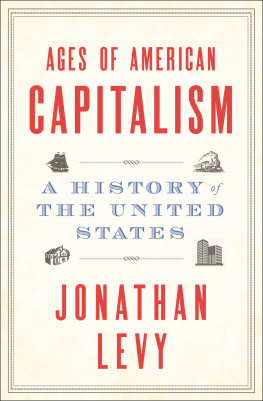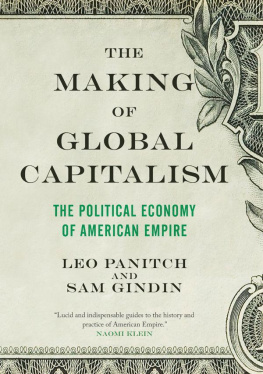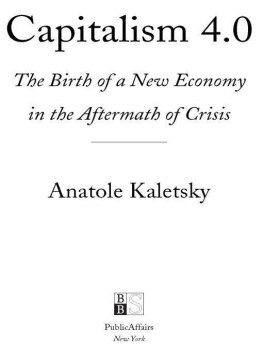Thank you for downloading this Simon & Schuster eBook.
Join our mailing list and get updates on new releases, deals, bonus content and other great books from Simon & Schuster.
C LICK H ERE T O S IGN U P
or visit us online to sign up at
eBookNews.SimonandSchuster.com
We hope you enjoyed reading this Simon & Schuster eBook.
Join our mailing list and get updates on new releases, deals, bonus content and other great books from Simon & Schuster.
C LICK H ERE T O S IGN U P
or visit us online to sign up at
eBookNews.SimonandSchuster.com
Acknowledgments
W e would like to thank our amazing research assistants, Ben Schneider and Jessica Stewart, for being generally swell and helping us to put together this reader. We hope that they will be teaching these documents very soon as graduate students.
Contents
Foreword
EDWARD E. BAPTIST
W elcome to this collection of important documents and essays about the history of American capitalism. We hope you will find these to be useful supplements to courses on the history of capitalism in the United States and elsewhere. There is no one right way to read this book, and no one right way to use it as part of a course. We only hope that you will find these readings as illuminating as we have found them. Taken together, these are the bricks and mortar that allowed us to build more than a class about a specific subject, taught in a specific format. In fact, they have enabled us to shape our understandings of how capitalism has developed and changed and how it continues to change in the United Statesand how those developments and changes shape lives, here and in the rest of the world.
As Louis Hyman explains in the first of the following readings, it is a strange but true fact that in the precise span of years during which the world watched the fall of North Atlantic capitalisms greatest opponentthe state-run quasi-socialist political economies of the Soviet blocmany academic historians stopped talking about capitalism. But even if the fish is unaware of the water it breathes, the fact that it has gills shapes everything about it. The growing system of capitalismdistinctive patterns of property ownership, work, trade, and investmentis what has given shape to U.S. history over the centuries. No major institution in the United States has been untouched by that system.
And given the power of the U.S. economy to shape world markets, and the power of the American government to make the rules of international trade and finance, and the attractiveness of the U.S. consumer market for overseas investors and manufacturers, and the attractiveness of American popular culture... well, you get the idea. American capitalism doesnt just shape U.S. history, it shapes world history. Although the all-powerful degree of that influence is newa postWorld War II phenomenonthe fact of it began even before the first bag of Georgia cotton picked by enslaved African Americans reached the Liverpool docks. So the story told in these readings is, to some extent, the story of the world as a whole since 1776, when the United States became the first postcolonial economy to launch itself into the struggle to develop and achieve prosperity. American democracy and American capitalism have grown hand-in-hand.
Here are the mosaic pieces of the vast, chaotic, astonishing story that has followed in the years since 1776. We look forward to hearing, seeing, reading about, and understanding how you fit them together into your own coherent picture.
Ithaca, NY
March 2014
Why Study the History of Capitalism?
LOUIS HYMAN
L ast spring, I received a phone call from a reporter at The New York Times. Since I have written a couple books on the history of American personal debt, the occasional inquiry from journalists was not out of place, but usually they want to hear about the five best financial tips for success, not real history.
This particular journalist, Jennifer Schuessler, asked me a very odd question: What does it mean to write the history of capitalism? I was dumbfounded. I paused. I asked her where she had even heard that term. She evaded the answeroh, its in the airbut I began to tell her about where I thought the burgeoning subfield had come from, peppering my response with terms like agency, contingency and other history jargon. She told me she could translate.
As I spoke, I kept wondering why she cared. After all, The New York Times does not usually run stories on the subfields of academic disciplines, especially history. So you can imagine my surprise when I woke up the next Sunday and saw the front-page headline: In History Departments, Its Up With Capitalism. For days, it was the most emailed story on the Times web site, with hundreds of people suddenly weighing in to comment on what capitalism meant.
The discussion forums were, in many ways, more revealing than the article itself. Internet trolls had their say, but I was much more struck by the forums threads of disagreement. Many readers pointed out what they thought all the scholars had missed or excluded, all in an effort to determine whether we were pro-corporate apologists funded by big money (no) or communist fifth columnists (a more interesting charge, but again, no).
For me, the ad hominem attacks were less telling than the fact that there was simply a fresh discussion of capitalism. For most of the readers who weighed in, capitalism is totally explained by either Karl Marx or Adam Smith (with the occasional John Maynard Keynes or Joseph Schumpeter tossed in). That is, capitalism is a system that can be universally explained through one theory or the other. Either you understand it or you do not. Either you read the right author or you are an ignoramus. In this view, the history of capitalism is simply the logical unfolding of a natural law, like an apple falling from a tree. As one reader put it, a history of capitalism would be as revelatory as a history of gravity.
If only events befell us as predictably as Isaac Newtons proverbial apple. History is not about proving a universal theory, but seeing how change occurs over time. As a scholarly practice, history is about explaining how events actually played out, with all their attendant unruliness. The essential problem is not to primly define capitalism like a schoolmarm, but to think about why capitalism, which appears to be so simple, evades easy definitions. And in the last decade, there has been a renewed interest among historians in not only challenging existing definitions, but in historicizing that very untidiness (much to the consternation of nominalists everywhere).
As the United States emerges from the most severe financial crisis since the Great Depression, the sudden urgency is not difficult to understand. Booms and busts buffet us with alarming frequency. But it is important to note that the term history of capitalism began to assume a currency in the historical profession sometime in the mid-2000s, between the tech crash and the Great Recession. While the recession has sparked renewed interest from the public, the new work preceded 2008 and marked an important shift that was not just intellectual but generational.
For two generations, almost no historians who wanted to make a name for themselves worked on economic questions. New Left scholars of the 1960s and 1970s emphasized movements that fought for social change (labor, womens, and African-American rights). The postmodern shift of the 1980s and 1990s pushed traditional subjects of economic history out of the field, and with it the stillborn subfield of cliometricsa quantitative approach to economic history. If a scholar wrote about the history of business, or even worse, businessmen, he or she seemed to betray right-wing tendencies. If you wrote about actual businesses, many on the left felt it was only to celebrate their leaders, the way that most historians wrote celebratory histories of the oppressed. Some stalwarts remained (of all political persuasions), but on the whole, they were marginalized.
Next page

